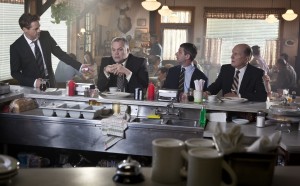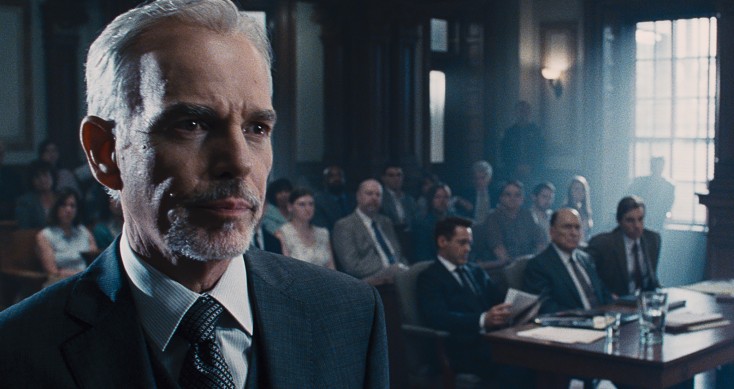
(l-r) ROBERT DOWNEY JR as Hank Palmer, VINCENT D’ONOFRIO as Glen Palmer, JEREMY STRONG as Dale Palmer and ROBERT DUVALL as Joseph Palmer in THE JUDGE. ©Warner Bros. Entertainment/Village Roadshow. CR: Claire Folger.
By ANGELA DAWSON
Front Row Features
HOLLYWOOD—In “The Judge,” Billy Bob Thornton (“Sling Blade”) plays a prosecutor who is out to convince a small town jury that a revered judge, played by Robert Duvall (“Tender Mercies,” “The Godfather” trilogy) of 42 years has committed murder by intentionally running down a defendant he erroneously let off years earlier.
The two Oscar winners previously co-starred in 1997’s “The Apostle” and in 2012’s “Jayne Mansfield’s Car,” which Thornton directed.
The venerated actors have a lot of respect for each other and are good friends off-screen. (Toward the end of a press conference, they can be overheard discussing college football.) Thornton and Duvall recently spoke about their roles in “The Judge,” in which Duvall plays Joseph Palmer, a man who has lived his life overseeing justice. Though he is widely admired in his small, Midwestern community, he is estranged from his middle son, Hank (Robert Downey Jr., also a producer on the film), a successful big city lawyer.
Returning home to attend his mother’s funeral, Hank and his dad lock horns, as they always have. Just as he is about to return to his life in the big city, Hank is called back home by his older brother (Vincent D’Onofrio) to represent their father, who has been arrested and charged with hit and run. Gradually, the two bullheaded men come to realize just how much they need each other.
Q: Mr. Thornton, you and Robert Duvall have been friends for a long time. You’ve worked together many times before. What was it getting to work together in this film? And what was it like doing that courtroom scene where you were grilling him?
Thornton: I actually had 111 scenes in the movie and now I only have about three left. No, it’s all there. It was great. It’s always great working with Bobby. He’s been my friend and mentor for many many years. This is the first time I had to prosecute him. I think that was the hardest part, overcoming … That’s one of the biggest things for an actor in a movie, if you know somebody very well, you’ve got to forget who that person is. So I knew that I was going to have to get in his face and that kind of thing, so it was a real challenge. It really was just to forget who was sitting there. At the end of the day, I just imagined my own father there (on the witness stand) and did it that way.
Q: Mr. Duvall, how are you doing today?
Duvall: When I look at (Downey’s shiny gold tipped) shoes, I’ll be OK. They’re very cool.
Q: You and Billy Bob Thornton have been friends for a long time. You’ve worked together many times before. What was it getting to work together in this film? And what was it like doing that courtroom scene where Thornton is grilling you?
Duvall: He’s great to work with. I won’t tell you what I call him because it gets repetitious. He’s terrific.
Q: Do you have a nickname for him?
Duvall: (he chuckles) The Hillbilly Orson Welles. I’ve been saying that for 18 years. It’s interesting because way back, many years ago, when Nikita Mikhalkov, the great Russian director came, I said, “I want you to meet somebody,” so I got Billy Bob from Malvern, Arkansas and Nikita Mikhalkov from Moscow. I got these two big talents to meet and we sat and talked for two or three hours. It was great. So he’s the real deal this guy.
Q: Robert Downey Jr. said he first tried to meet you at a restaurant. Do you remember that?
Duvall: I didn’t know who he was.
Q: Anything surprise you about working with Robert Downey Jr.?
Duvall: Nice. Terrific guy. Wonderful actor. His wife (Susan Downey) is a wonderful producer. It was a tough privilege but a privilege. We had 60 days to do the tough privilege. Sometimes it seemed like it was only 30 days but we got it done. It was a lot of work but it was good, honest work, and a lot of fun at times. It was a lot of fun in between with these guys.
Q: Didn’t he turn you on to a bad sushi restaurant?
Duvall: No. He took me to the right ones. It’s the best sushi I’ve had so far.
Q: There is a complicated scene with you and Robert Downey Jr. in the bathroom where you start to lose the ability to control your bowels. What did you discuss about it before doing the scene?
Duvall: We just did it. I initially turned the script down because of that scene. It didn’t appeal to me, that whole scene. But then, after talking with everybody, (director) David Dobkin and my wife and everybody, I decided to go ahead and do it. You gotta just jump in and do it. We didn’t talk about it; we just did it. Like any good scene, you just do it, and let it find it’s own rhythm and identity. You always try to find a bit of humor to offset, either vulnerability or humor is very important in movies to offset serious scenes.
Q: In this film there are great performances. People are already talking about awards. Are you ready for it?
Duvall: I have no idea. Could be. Who knows? You never know. I’ve seen people who really deserve it (get it), many many, and some that do not deserve it. This whole town is built on the anticipation of the Oscars. Everything is built on that, it seems. I have no idea, though.
Q: You and your wife (Luciana Pedraza) made a film about tango dancing back in 2002. Do you two still enjoy the tango?
Duvall: Oh yeah, it’s a hobby. It’s a social dance.





